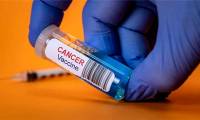
The vaccine being tested is based on the use of non-pathogenic viruses with anti-cancer activity, which are introduced into the patient's body.

After decades of limited success, scientists say their research is reaching a turning point, with many predicting cancer vaccines within the next five years.

Unlike traditional vaccines that prevent disease, personalized cancer vaccines are created for use in people who already have cancer.

Scientists have discovered a protein that can directly block DNA damage.

The mRNA vaccine to prevent melanoma is expected to launch in 2025, after being approved by US and European regulators.

Russian President Vladimir Putin said the country's scientists are close to creating a cancer vaccine and can soon provide it to patients.

According to CDC (US Centers for Disease Control and Prevention), about 14 million Americans are infected with HPV each year.

With similar immunosuppression mechanisms, US scientists have removed both the main tumor and distant metastases in the bodies of experimental mice with cancer.

The first person to test the new vaccine was revealed by Moderna Therapeutics to be a lung cancer patient. This patient had a tumor but had surgery removed.
 The vaccine being tested is based on the use of non-pathogenic viruses with anti-cancer activity, which are introduced into the patient's body.
The vaccine being tested is based on the use of non-pathogenic viruses with anti-cancer activity, which are introduced into the patient's body. After decades of limited success, scientists say their research is reaching a turning point, with many predicting cancer vaccines within the next five years.
After decades of limited success, scientists say their research is reaching a turning point, with many predicting cancer vaccines within the next five years. Unlike traditional vaccines that prevent disease, personalized cancer vaccines are created for use in people who already have cancer.
Unlike traditional vaccines that prevent disease, personalized cancer vaccines are created for use in people who already have cancer. Scientists have discovered a protein that can directly block DNA damage.
Scientists have discovered a protein that can directly block DNA damage. The mRNA vaccine to prevent melanoma is expected to launch in 2025, after being approved by US and European regulators.
The mRNA vaccine to prevent melanoma is expected to launch in 2025, after being approved by US and European regulators. Russian President Vladimir Putin said the country's scientists are close to creating a cancer vaccine and can soon provide it to patients.
Russian President Vladimir Putin said the country's scientists are close to creating a cancer vaccine and can soon provide it to patients. According to CDC (US Centers for Disease Control and Prevention), about 14 million Americans are infected with HPV each year.
According to CDC (US Centers for Disease Control and Prevention), about 14 million Americans are infected with HPV each year. With similar immunosuppression mechanisms, US scientists have removed both the main tumor and distant metastases in the bodies of experimental mice with cancer.
With similar immunosuppression mechanisms, US scientists have removed both the main tumor and distant metastases in the bodies of experimental mice with cancer. The first person to test the new vaccine was revealed by Moderna Therapeutics to be a lung cancer patient. This patient had a tumor but had surgery removed.
The first person to test the new vaccine was revealed by Moderna Therapeutics to be a lung cancer patient. This patient had a tumor but had surgery removed.








 If the sea suddenly disappears, why do hundreds of millions of people have to urgently evacuate?
If the sea suddenly disappears, why do hundreds of millions of people have to urgently evacuate? Why can't humans feel the temperature inside the Earth when it's 6,000 degrees Celsius?
Why can't humans feel the temperature inside the Earth when it's 6,000 degrees Celsius? What is the difference between Western eunuchs and Chinese eunuchs?
What is the difference between Western eunuchs and Chinese eunuchs? Secret documents reveal 'unexplained' discovery about Egyptian pyramids
Secret documents reveal 'unexplained' discovery about Egyptian pyramids Mothman: Urban Legend or Unknown Creature?
Mothman: Urban Legend or Unknown Creature? Scientists plan to bring back the Dodo bird, but how exactly will they do it?
Scientists plan to bring back the Dodo bird, but how exactly will they do it? How long does it take to reach another star system besides the Solar System?
How long does it take to reach another star system besides the Solar System? Finding the origin of 'alien spy ship'
Finding the origin of 'alien spy ship'